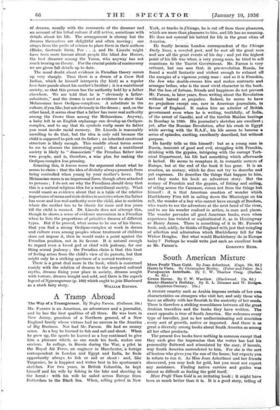A Tramp Abroad
The Way of a Transgressor. By Negley Farson. (Gollancz. 10s.) Mn. FAnsoil is an American, an adventurer and a journalist, and he has the best qualities of all three. He was born in New Jersey, grandson of a Northern general, of a New England family whose virtues had no success in the America of Big Business. Nor had Mr. Farson. He had no money sense. As a boy he learned to fish and sail and shoot. When he grew up, the sports he learned as a boy continued to give him a pleasure which, as one reads his book, makes one envious. In college, in Russia during the War, a pilot in the Royal Air Force, an engineer in Manchester, a foreign correspondent in London and Egypt and India, he finds opportunity always,, to fish or sail or shoot : and, like Turgeniev, he is happiest and writes best in his sportsman's sketches. For two years, in British Columbia, he kept himself and his wife by fishing in the lake and shooting in the forest : with . his wife he sailed across Europe from Rotterdam to the Black Sea. When, selling petrol in New
, York, or trucks in,Fhicago, he is cut off from these pleasures, which are more than pleasures to him, and life has no meaning.
He does not conceal his` hatred for life in the great cities of . America.
He finally became _London correspondent of the Chicago Daily News, a coveted post and he met all the great men and saw aft the great events Of his day : and yet the highest Point of his life Was-when, a very young man, he tried to sell munitions tio the Tsarist Goveinthent. Mr. Farion is very reticent, but one sees that, in pre-revolution Russia, he found a world fantastic and violent enough to exhaust all the energies of a vigorous, young man : and so it is Frumkin, the Jew who double-crosses him and makes contracts and arranges bribes; who is the most vivid character in the book. . But the loss of fortune, friends and happiness do not prevent Mr. Farson, in later years, from writing about the Revolution without hatred or... prejudice. Indeed, he seems to have no prejudices except one, rare in American journalists, in favour Of England.' It makes him an admirer of British goyernment even when he is writing, truthfully, of India, of the arrest of Gandhi, and of the terrible Maidan beatings in Bombay in 1930. His journalist's sketches are excellent ; yet, after the Russian Reyolution, after his crash in Egypt while serving with the R.A.F., his life seems to become a series of episodes, exciting, excellently described, but without purpose.
He hardly tells us this himself : but as a young man in Russia, innocent of good and evil, struggling with Frumkin, drinking with the gypsies, intriguing with the corrupt Tech- , nical Department, his life had something which afterwards it lacked. He seems to recapture it, in romantic corners of Europe, -but at the, end of the book it has gone. It is an emotion, an ecstasy; which he does not try to describe and yet expresses. He describes the things that happen to him, and they make his book an adventure story. But the ecstasy of Frumkin and the gypsies, of fishing and ,sailing, Of riding across the Caucasus, comes not from the things but himself : it is that American emotion of wonder which Huckleberry Finn felt in sailing down the Mississippi on his raft, the wonder of a boy who cannot have enough of freedom, who wants to see the adventure at the next bend of the river, and to see his wonder realised in action, in men and places. The wonder pervades all good American books, even when experience has twisted or sophisticated it, as in Hemingway or Henry James. There is something of it in Mr. Farson's book, and, oddly, he thinks of.England with just that:Mingling of affection and admiration which Huckleberry felt for the Widow Douglas. But what 'would Huckleberry do in-Europe today ? Perhaps lie would write just such an excellent book










































 Previous page
Previous page